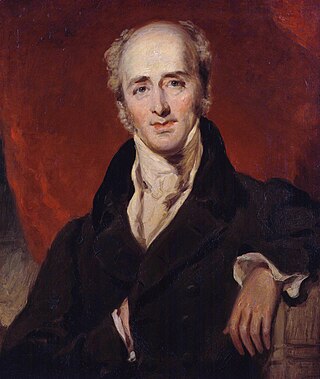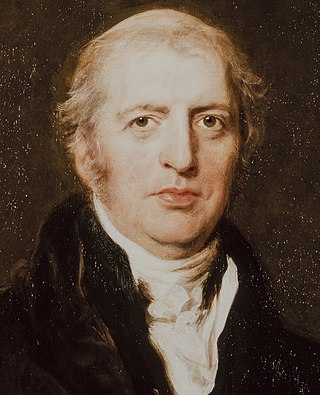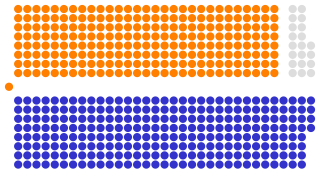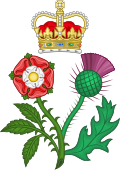
The Parliament of Great Britain was formed in May 1707 following the ratification of the Acts of Union by both the Parliament of England and the Parliament of Scotland. The Acts ratified the treaty of Union which created a new unified Kingdom of Great Britain and created the parliament of Great Britain located in the former home of the English parliament in the Palace of Westminster, near the City of London. This lasted nearly a century, until the Acts of Union 1800 merged the separate British and Irish Parliaments into a single Parliament of the United Kingdom with effect from 1 January 1801.

The 1832 United Kingdom general election, the first after the Reform Act, saw the Whigs win a large majority, with the Tories winning less than 30% of the vote.

"Unreformed House of Commons" is a name given to the House of Commons of Great Britain before it was reformed by the Reform Act 1832, the Irish Reform Act 1832, and the Scottish Reform Act 1832.

The 1830 United Kingdom general election was triggered by the death of King George IV and produced the first parliament of the reign of his successor, King William IV. Fought in the aftermath of the Swing Riots, it saw electoral reform become a major election issue. Polling took place in July and August and the Tories won a plurality over the Whigs, but division among Tory MPs allowed Earl Grey to form an effective government and take the question of electoral reform to the country the following year.
Dysart Burghs was a district of burghs constituency of the House of Commons of Great Britain from 1708 to 1801 and of the House of Commons of the United Kingdom from 1801 to 1832. It elected one Member of Parliament (MP).

The first Parliament of the Kingdom of Great Britain was established in 1707 after the merger of the Kingdom of England and the Kingdom of Scotland. It was in fact the 4th and last session of the 2nd Parliament of Queen Anne suitably renamed: no fresh elections were held in England or in Wales, and the existing members of the House of Commons of England sat as members of the new House of Commons of Great Britain. In Scotland, prior to the union coming into effect, the Scottish Parliament appointed sixteen peers and 45 Members of Parliaments to join their English counterparts at Westminster.

The 2nd Parliament of Great Britain was the first British Parliament to actually be elected, as the 1st Parliament of Great Britain had been drawn from the former Parliament of England and Parliament of Scotland.

The 1820 United Kingdom general election was triggered by the death of King George III and produced the first parliament of the reign of his successor, King George IV. It was held shortly after the Radical War in Scotland and the Cato Street Conspiracy. In this atmosphere, the Tories under the Earl of Liverpool were able to win a substantial majority over the Whigs.
Multi-member constituencies existed in the Parliament of the United Kingdom and its predecessor bodies in the component parts of the United Kingdom from the earliest era of elected representation until they were abolished by the Representation of the People Act 1948. Since the 1950 general election, all members of the House of Commons have been elected from single-member constituencies.

In the first Parliament to be held after the Union of Great Britain and Ireland on 1 January 1801, the first House of Commons of the United Kingdom was composed of all 558 members of the former Parliament of Great Britain and 100 of the members of the House of Commons of Ireland.
The 1796 British general election returned members to serve in the 18th and last House of Commons of the Parliament of Great Britain. They were summoned before the Union of Great Britain and Ireland on 1 January 1801. The members in office in Great Britain at the end of 1800 continued to serve in the first Parliament of the United Kingdom (1801–02).
The 1780 British general election returned members to serve in the House of Commons of the 15th Parliament of Great Britain to be summoned after the merger of the Parliament of England and the Parliament of Scotland in 1707. The election was held during the American War of Independence and returned Lord North to form a new government with a small and rocky majority. The opposition consisted largely of the Rockingham Whigs, the Whig faction led by the Marquess of Rockingham. North's opponents referred to his supporters as Tories, but no Tory party existed at the time and his supporters rejected the label.
The 1754 British general election returned members to serve in the House of Commons of the 11th Parliament of Great Britain to be summoned, after the merger of the Parliament of England and the Parliament of Scotland in 1707. Owing to the extensive corruption and the Duke of Newcastle's personal influence in the pocket boroughs, the government was returned to office with a working majority.
The 1747 British general election returned members to serve in the House of Commons of the 10th Parliament of Great Britain to be summoned, after the merger of the Parliament of England and the Parliament of Scotland in 1707. The election saw Henry Pelham's Whig government increase its majority and the Tories continue their decline. By 1747, thirty years of Whig oligarchy and systematic corruption had weakened party ties substantially; despite that Walpole, the main reason for the split that led to the creation of the Patriot Whig faction, had resigned, there were still almost as many Whigs in opposition to the ministry as there were Tories, and the real struggle for power was between various feuding factions of Whig aristocrats rather than between the old parties. The Tories had effectively become an irrelevant group of country gentlemen who had resigned themselves to permanent opposition.
The 1741 British general election returned members to serve in the House of Commons of the 9th Parliament of Great Britain to be summoned, after the merger of the Parliament of England and the Parliament of Scotland in 1707. The election saw support for the government party increase in the quasi-democratic constituencies which were decided by popular vote, but the Whigs lost control of a number of rotten and pocket boroughs, partly as a result of the influence of the Prince of Wales, and were consequently re-elected with the barest of majorities in the Commons, Walpole's supporters only narrowly outnumbering his opponents.
The 1734 British general election returned members to serve in the House of Commons of the 8th Parliament of Great Britain to be summoned, after the merger of the Parliament of England and the Parliament of Scotland in 1707. Robert Walpole's increasingly unpopular Whig government lost ground to the Tories and the opposition Whigs, but still had a secure majority in the House of Commons. The Patriot Whigs were joined in opposition by a group of Whig members led by Lord Cobham known as the Cobhamites, or 'Cobham's Cubs'.
The 1715 British general election returned members to serve in the House of Commons of the 5th Parliament of Great Britain to be held, after the 1707 merger of the Parliament of England and the Parliament of Scotland. In October 1714, soon after George I had arrived in London after ascending to the throne, he dismissed the Tory cabinet and replaced it with one almost entirely composed of Whigs, as they were responsible for securing his succession. The election of 1715 saw the Whigs win an overwhelming majority in the House of Commons, and afterwards virtually all Tories in central or local government were purged, leading to a period of Whig ascendancy lasting almost fifty years during which Tories were almost entirely excluded from office. The Whigs then moved to impeach Robert Harley, the former Tory first minister. After he was imprisoned in the Tower of London for two years, the case ultimately ended with his acquittal in 1717.
The 1708 British general election was the first general election to be held after the Acts of Union had united the Parliaments of England and Scotland.

The 1705 English general election saw contests in 110 constituencies in England and Wales, roughly 41% of the total. The election was fiercely fought, with mob violence and cries of "Church in Danger" occurring in several boroughs. During the previous session of Parliament the Tories had become increasingly unpopular, and their position was therefore somewhat weakened by the election, particularly by the Tackers controversy. Due to the uncertain loyalty of a group of 'moderate' Tories led by Robert Harley, the parties were roughly balanced in the House of Commons following the election, encouraging the Whigs to demand a greater share in the government led by Marlborough
After the conclusion of the 1698 English general election the government led by the Whig Junto believed it had held its ground against the opposition. Over the previous few years, divisions had emerged within the Whig party between the 'court' supporters of the junto and the 'country' faction, who disliked the royal prerogative, were concerned about governmental corruption, and opposed a standing army. Some contests were therefore between candidates representing 'court' and 'country', rather than Whig and Tory. The Whigs made gains in the counties and in small boroughs, but not in the larger urban constituencies. After Parliament was dissolved on 7 July 1698, voting began on 19 July 1698 and continued until 10 August, with an order directing the new House of Commons to meet on 24 August 1698.












